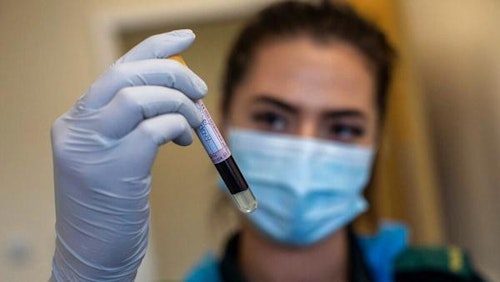Keep up to date with the latest coronavirus developments here.
Here's a summary of the latest developments
The UK has become the second country to record more than 40,000 deaths after the US
The head of the Scientific Council in France says the outbreak is "under control"
The EU Commission calls for internal borders to be opened by end of June
Bombardier and Bentley announce job cuts
Authors retract study on hydroxychloroquine which halted trials worldwide
Global Vaccine Summit attempts to coordinate COVID-19 inoculation efforts
Coronavirus statistics: Latest numbers on COVID-19 cases and deaths
Which European countries have opened their borders ahead of the summer holiday season?

 ${title}
${title}
Live ended
White House forces reporters to ditch social distancing rules
"I would remind you that those in the (press) pool are tested, everyone is temperature-checked and asked if they have had symptoms," he added.
Analysis: Will COVID-19 usher in a new wave of populism in Europe?
In the decade that followed the global financial crash of 2008, a wave of protest and populism battered and challenged many of the perceived norms of Europe’s political discourse.
Coupled with the subsequent Eurozone and migrations crises, politicians were branded as an elite, out of touch with mass public opinion. The fire took hold. From anti-austerity measures in Greece, to the rise of the far-right in Germany, to increasing authoritarianism in Central Europe. Nationalism in Spain, populism in Italy, the Yellow Vest protesters in France and, of course, Brexit in Britain. European politics was upended.
But Europe in many ways now faces a much bigger crisis. The economic shock from the lockdown of almost the entire continent will lead to a recession far deeper than the one we saw 10 years ago. Millions more could lose their jobs, more businesses could go bust. Could we also see more political turmoil?
READ THE FULL ANALYSIS BY EURONEWS' POLITICAL EDITOR HERE.
Italian death toll rises by 85
Evictions in UK suspended for another 2 months
Bentley and Bombardier announce thousands of job cuts
Two major companies in the automotive and aviation sector announced major job cuts on Friday.
Bombardier Aviation, based in Canada, and British carmaker Bentley are set to cut 2,500 and 1,000 jobs respectively.
Both cited the coronavirus crisis as a factor and it comes hot on the heels of other grim news regarding the economy.
Late last month Nissan announced the closure of its Barcelona branch, which it says will see 3,000 jobs go.
"He hit me with an axe handle": Europe's lockdowns lead to a surge in domestic violence
Even in normal times one in three women are reported to suffer violent abuse from a partner, ex-partner or family member. On average, one hundred women in the world die every day - killed by someone they know. Eveline (not her real name) is one of the many victims.
"I was attacked by my ex-partner who came to my company's offices and said he wanted to kill me. He hit me with an axe handle violently on the head. There was blood everywhere.
The lockdown is believed to have led to a huge explosion in violence with some countries reporting that abuse has risen by a third. Despite those estimates, it remains difficult to get a clear picture on how the pandemic has affected domestic violence in Europe as the data are not collected in a systematic manner.
Blood of COVID-19 patients could help predict how ill they will get
While older patients and those with underlying conditions are typically more susceptible to the most severe forms of COVID-19, the pandemic has shown that young, previously healthy people can also develop serious symptoms.
A joint German-British study has discovered 27 biomarkers in the blood of infected patients that could help us understand why symptoms vary so dramatically – and predict how ill a person might become.
The findings could help doctors decide what treatment to prescribe, and could provide scientists with new targets in their hunt for effective drugs.

Kenyan police involved in 15 deaths since COVID-19 lockdown imposed
Kenya's Independent Policing Oversight Authority (IPOA) told the AFP news agency that police forces have been involved in the killing of 15 people since a curfew was introduced in late March as part of the lockdown.
The IPOA said it had received 87 complaints against police and that preliminary investigations had found that "15 deaths and 31 incidents where victims sustained injuries have directly been linked to actions of police officers during the curfew enforcement."
In April, Human Rights Watch had accused the Kenyan police of imposing the curfew in a "chaotic and violent manner from the start".
France records 46 new hospital deaths
UK Health Secretary encourages donating blood to help coronavirus patients
All England hospital staff and visitors required to wear face coverings from June 15
UK: 357 new deaths in the past 24 hours
It brings the total to over 40,000. The UK remains Europe's worst-affected country.
The total number of COVID-19 cases recorded is over 283,000.
Matt Hancock stressed that coronavirus remains the main threat urging people not to attend gatherings of more than six people amid protests erupted after the death of George Floyd.
UK Health Secretary: 'Percentage of people testing positive falling consistently'
UK coronavirus briefing starts
'Don't go out, seek medical help' if you have coronavirus symptoms, WHO says
WHO director Michael Ryan said it during today's briefing, stressing the importance of tracking contacts in such cases.
Face masks should consist of at least three layers of material: WHO
- Before putting on a mask, clean hands with alcohol-based hand rub or soap and water.
- Cover mouth and nose with mask and make sure there are no gaps between your face and the mask.
- Avoid touching the mask while using it; if you do, clean your hands with alcohol-based hand rub or soap and water.
- Replace the mask with a new one as soon as it is damp and do not re-use single-use masks.
- To remove the mask: remove it from behind (do not touch the front of mask); discard immediately in a closed bin; clean hands with alcohol-based hand rub or soap and water.
Coronavirus pandemic 'largely overcome' in the US: Trump
World Environment Day: UN calls for more action despite progress made after the coronavirus pandemic
'Long period of growth ahead' for the US: Trump
"We’re going to have a very good July and August, maybe spectacular autumn," president Trump said.
"Next year will be the best year we’ve had economically."
US unemployment drops unexpectedly to a still-high 13.3%
The US unemployment rate fell unexpectedly in May to 13.3% — still on par with what the nation witnessed during the Great Depression — as states loosened their coronavirus lockdowns and businesses began recalling workers faster than economists had predicted.
The government said Friday that the economy added 2.5 million jobs last month, driving unemployment down from 14.7% in April.
For weeks, economists had been warning that unemployment in May could hit 20% or more, rivaling what was seen during the depths of the Depression in the 1930s.
Once again, the Labor Department acknowledged making errors in how it classified people as employed and said the real May rate is worse than the numbers indicate. But the government made the same mistakes in April, and together the figures still show the job market is improving.
The May job gain, which confounded economists' expectations of another round of severe losses, suggests that thousands of stores, restaurants, gyms and other companies reopened and rehired more quickly than many analysts had forecast.
Hydroxochloroquine has 'no beneficial effect' against COVID-19: British clinical trial
Paris march against police violence banned over coronavirus concerns
Police have banned a planned protest against police violence in Paris on Saturday because of health measures restricting gatherings during the coronavirus pandemic.
A protest decrying systemic racism and calling for justice for Floyd and other victims of police brutality was planned to take place outside the U.S. Embassy.
But on Friday, Police Prefect Didier Lallement said such protests “are not authorised” because virus safety measures “prohibit any gathering, in the public space, of more than 10 people.” He issued an order banning the Floyd demonstration and another protest planned for the same day.
Lallement said “in addition to the disturbances to public order that these rallies can generate... the health risks they could cause remain significant.”
Over 29,000 people died in France in the pandemic.
Coronavirus: How COVID-19 is hitting smaller English football clubs hardest
Bombardier plane manufacturer cuts thousands of jobs, cites coronavirus crisis
Ireland to accelerate lifting of its lockdown: PM
COVID-19 pandemic 'no silver lining' for the environment
‘Full functioning of Schengen’ by end of June
Bentley cuts 1,000 jobs due to pandemic
British Airways considering legal action against the UK government over coronavirus quarantine measures
British Airways is considering legal action against the UK government's plans to force anyone arriving into the country to quarantine themselves for 14 days in order to stem the spread of the coronavirus.
Willie Walsh, the chief executive of International Airlines Group, which runs the British flag carrier, told Sky News he is reviewing the situation with lawyers.
He said the “irrational” quarantine rules would “torpedo” the airline’s chances of flying in July.
Earlier this week, the government changed tack and said it would impose a blanket quarantine on anyone travelling to the UK from 8 June.
Airlines, as well as much of the UK's tourism sector, are clearly worried that the new rules will derail plans to get their businesses up and running as lockdown restrictions are eased.
The government has said it will review the policy every three weeks and is looking into "international travel corridors" between countries that are considered to be safe and which could avoid the need for quarantines.
Culling of 10,000 minks postponed after two cases of COVID-19 animal transmission in the Netherlands
A Dutch judge has ordered the postponement of the culling of over 10,000 minks from a breeding farm where animals have been infected with COVID-19.
The culling, planned to start on Friday, was ordered by Dutch authorities because the infected animals are suspected to have transmitted the disease to two employees of the farm.
But on Thursday evening, a judge from an economic court ordered the culling to be postponed following a complaint filed by groups for the protection of animals.
The culling is to be suspended until at least Monday, when the animal protection groups will defend their case in a hearing.
Coping in the age of COVID-19: A gourmet restaurant hungry for diners

The coronavirus crisis has wreaked havoc on businesses around the world. In Spain, it has left an ambitious chef waiting for orders.
Former Michelin-starred chef Roberto Terradillos does not yet know when he will be able to reopen the doors of Terra, his restaurant in the northern city of Palencia. For now, he has to settle for takeaway services.
Not all parts of Spain are lifting lockdown restrictions at the same pace, leaving some businesses frustrated. In Madrid, Barcelona, and in the northwestern region of Castile and Leon – zones deemed at higher risk from coronavirus infections – only the terraces of bars and restaurants can take in customers these days.











